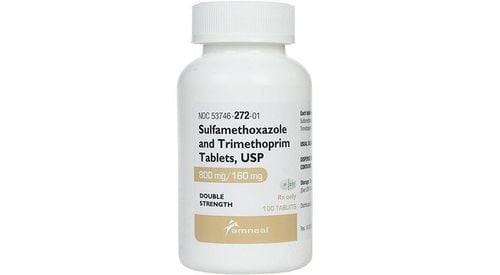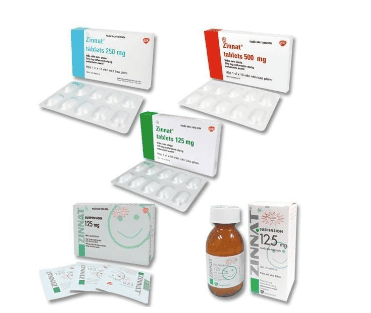This is an automatically translated article.
Agiclari drug contains the antibiotic Clarithromycin, this is a macrolide antibiotic, has antibacterial effect and is indicated in cases of infections caused by susceptible bacteria. Find out more information about the drug through the article below.
1. What are the effects of Agiclari?
What are the effects of Agclari? The main ingredient of Agiclari is Clarithromycin 500mg and excipients just enough for 1 tablet. Agclari is available in the form of a film-coated tablet. Clarithromycin is a semi-synthetic macrolide antibiotic. The mechanism of antibacterial action of the drug is to bind to the ribosomes of pathogenic bacteria, thereby helping to prevent their protein biosynthesis, causing these bacteria to die or not grow.
Clarithromycin is more effective than antibiotics of the same group, Erythromycin, against Moraxella (Branhamella) catarrhalis and Legionella spp. Clarithromycin has very strong antibacterial activity against Chlamydia spp., Ureaplasma urealyticum and is superior to other macrolides against intracellular Mycobacterium avium. The drug is also effective against M. leprae.
2. Indications and contraindications of Agiclari
2.1.Indications for Agiclari with antibacterial effect should be used in:
Patients with lower respiratory tract infections and upper respiratory tract infections such as: rhinosinusitis, pharyngitis, acute bronchitis, pneumonia acquired in community . Infections of the skin and infections of structures around the skin. Used in cases of bacterial superinfection in HIV-infected patients such as Mycobacterium avium, M. avium complex Used in combination in regimens to treat patients with ulcers stomach - duodenum caused by H. pylori infection. 2.2.Contraindications: Agiclari is not used in the following cases:
Hypersensitivity to Macrolide antibiotics or Clarithromycin or any excipients in the formula. The patient is suffering from severe liver failure. The patient has hypokalemia causing a prolonged QT interval. Do not use in combination with ergot derivatives or any of the following drugs: Cisaprid, Pimozid; Terfenadine; Astemizol and the drug Simvastatin.
3. Dosage and usage of Agiclari
3.1 How to take Agclari The drug is used orally, patients can use it before, after or during meals.
Patients need to take the medicine with a lot of water to avoid affecting the kidney function much, take the drug at the same time of day to maintain the drug concentration in the body to increase the bactericidal effect and avoid missed doses.
When using the drug in accordance with the dose and do not arbitrarily stop the drug even though there are signs of improvement, use the drug as prescribed.
3.2 Dosage of Agiclari For adults and children over 12 years old:
Treatment of infections of the upper and lower respiratory tract, infections of the skin and surrounding tissues: Use at a dose of 250mg x 2 times/day for treatment for a period of 7 days. Depending on the case, if severe, the treatment dose can be increased to 500mg, twice daily for 14 days. Treatment for patients with duodenal ulcer caused by H. pylori: Use a dose of 1 tablet 500mg, twice a day, treat for a period of 7-14 days and combine with an antibiotic, a drug proton pump inhibitors (PPIs). Patients infected with Mycobacterium strains: When the starting dose is 500mg, 2 times a day for treatment for 3-4 weeks, the treatment dose can be increased to 1000mg/2 times/day. For patients with renal impairment: When taking this drug, it is necessary to reduce the total therapeutic dose by half and the drug should not be used for more than 14 days.
3.3. What to do in case of an overdose? When you overdose you may experience the following symptoms: Symptoms are similar to unwanted effects. Patients with bipolar disorder when taking high doses, appear paranoid, hypoxic, altered mental status. If the patient accidentally overdoses and has serious side effects, the patient should be taken immediately to the nearest medical center for timely treatment.
4. Side effects of Agiclari
Besides the main effects of the drug, when you are treated with Agiclari you may also experience some unwanted effects such as:
Patients may experience conditions such as stomatitis, glossitis, headache, ... Joint pain, muscle pain, depression; Allergic reactions ranging from mild urticaria, urticaria, and skin rash to severe anaphylaxis have also been reported. Common hepatic dysfunction is transient and reversible; cholestatic hepatitis with or without jaundice; Liver and biliary disorders; digestive disorders. QT interval prolongation, ventricular tachycardia and torsades de pointes; Decreased platelet count; Pancreatitis; Dizziness, dizziness, signs of paresthesia, convulsions; cause interstitial nephritis, kidney failure; Tinnitus or hearing loss is usually reversible; Pseudomembranous colitis; Fatal liver failure; Stevens-Johnson syndrome, toxic epidermal necrolysis. Patients should notify their doctor or immediately go to a medical center for medical advice if they appear to have symptoms that you suspect are caused by the use of the drug.
5. Things to pay attention to when using Agclari
Antibiotics only work in cases of bacterial infections, you should not take them when you have a viral or fungal infection. Use medication exactly as prescribed to ensure safety. Do not use stimulants such as alcohol, beer, or tobacco while taking the drug. For pregnant and lactating women: The benefits and risks should be carefully considered when using the drug for pregnant women and mothers who are breastfeeding. Should only be used when the benefit outweighs the risk to the fetus. In case of prolonged use of this drug, it is necessary to prevent non-susceptible infections such as fungal infections, mild to severe pseudomembranous colitis. If the patient has persistent or severe diarrhea, discontinuation of the drug should be considered and appropriate treatment instituted.
6. Drug interactions
Some drugs that may interact with this drug include:
Clarithromycin may increase the anticoagulant effect of drugs in the Coumarin class, such as Acenocoumarol and Warfarin. Thereby increasing the risk of bleeding, which should be prevented. Drugs such as Ritonavir, Saquinavir, and Atazanavir used in the treatment of HIV infection may increase the absorption of Clarithromycin, leading to increased side effects. Clarithromycin may enhance the hypoglycemic effect of some diabetes medicines such as Glibenclamide, Repaglinide and Saxagliptin. Care should be taken when taking concomitantly to avoid the risk of hypoglycaemia. Taking clarithromycin in combination with Ergot (ergot) derivatives such as Ergotamine, Dihydroergotamine, or Methysergide may increase the risk of serious side effects associated with these drugs. Therefore, the combination is contraindicated. You may have an increased risk of an irregular heart rhythm if you take any of the following medicines with Clarithromycin: antiarrhythmics such as Amiodarone, Procainamide, Disopyramide, Dronedarone; antihistamines such as Astemizole, Mizolastine, or the medicine Terfenadine; antidepressants such as Citalopram, Escitalopram, Clomipramine; antimalarial drugs such as Halofantrine, Chloroquine, Quinine, Mefloquine,... azole antifungal drugs such as Ketoconazole, Fluconazole, Itraconazole: Increases the risk of causing myocardial toxicity with manifestations of QT interval prolongation, torsades de pointes, Heart stop. To ensure safety and avoid drug interactions, you should consult your doctor if you intend to take any other medications.
Storage: Store Agclari in a cool, dry place. The drug should be kept in the original packaging, to avoid confusion during use as well as affect the drug's activity. Keep the medicine out of the reach of children
Agiclari is used only when prescribed by a doctor, do not self-medicate because of the increased risk of side effects and drug resistance. Watch for abnormalities and notify your pharmacist or doctor for advice as needed.
Follow Vinmec International General Hospital website to get more health, nutrition and beauty information to protect the health of yourself and your loved ones in your family.













